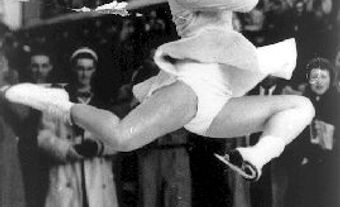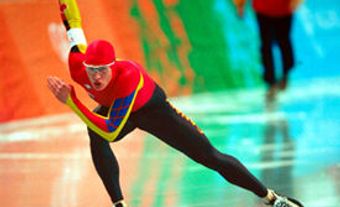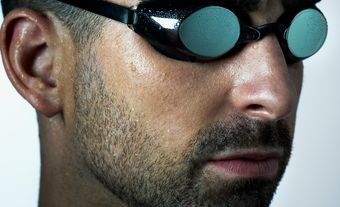This article was originally published in Maclean’s magazine on February 25, 2002. Partner content is not updated.
Among the rumours floating around Salt Lake City last week was one suggesting U.S. special forces searching Al-Qaeda caves in Afghanistan had found a document listing the finishing order of the OLYMPIC ice dance competition. It was a joke, of course, and it got a big laugh.Skating Scandal at 2002 Winter Olympics
Among the rumours floating around Salt Lake City last week was one suggesting U.S. special forces searching Al-Qaeda caves in Afghanistan had found a document listing the finishing order of the OLYMPIC ice dance competition. It was a joke, of course, and it got a big laugh. And it had a point: with the vote-tampering revelations that sullied a terrific pairs event, the highest level of figure skating had sunk to an all-time low, and it couldn't have come at a worse time. There's talk the International Olympic Committee might downsize future Winter and Summer Games. Dump some events here, scale back some arenas there. Might even put a cap on host-city spending. Getting rid of figure skating would kill two birds, since it would eliminate a historically problematic sport and allow organizers to stock fewer sequins.
Scandal management, meanwhile, emerged as a possible demonstration sport at these Games. Successful contestants excelled at righteous indignation, lawyerly appeal preparation, press-conference quotability and, when caught in a dicey situation, convincing denial. The downside, though, is that scandal management is a judged sport, no more scientific than the one that originally declared Elena Berezhnaya and Anton Sikharulidze winners of the pairs figure skating competition. The Russians got five of nine judges' first-place marks even though any modestly informed fan could see that Canadians Jamie SALÉ and David PELLETIER had delivered a technically superior performance. The dirty decision and resulting furor over Skategate, as folks here so dully call it, produced one juicy scandal. The fact that it occurred at an American Olympics gave it a worldwide audience in the billions. Skating commentators called it an embarrassment for the sport and for the Games.
Volume-wise, it wasn't Nancy Kerrigan versus Tonya Harding, but it was darn close. For five straight days until Salé and Pelletier were awarded their own gold medals, the saga of two handsome Canadians skating to the theme from Love Story (thankfully, their routine was better than both the book and the movie) became a front-page staple, even for the grey New York Times, not to mention major news for TV stations on five continents. In the 24 hours immediately after the competition, Salé and Pelletier were interviewed by all three U.S. TV network morning shows, practically every Canadian outlet with a Betacam and NBC's Tonight Show with Jay Leno. And like the 1994 scandal in which Harding was linked to an attack on Kerrigan, this story dwarfed the Olympics. Heck, Salé and Pelletier were twice the lead story on the Best Damn Sports Show Period, a Fox Sports Net cable "guy talk" show that usually confines itself to pro sports, sex and bathroom humour. Picture comedian Tom Arnold, Roseanne's ex, talkin' salchows and axels with beefy former baseball player John Kruk and retired hoops star John Salley. Barbara Ann Scott would cringe.
Thrust reluctantly into the fray, Ottavio Cinquanta, Italian head of the International Skating Union, did little initially to defend the sport from accusations it's as fixed as pro wrestling (ouch!). At his first news conference, the former speed skater trotted out the same explanations he offered when curious judging caused similar problems at the last Games in Nagano. Cinquanta told the packed room here - more than 20 TV cameras, several hundred reporters - that there was no evidence to support allegations that the French judge had been pressured by her national federation to support the Russian pair in return for the Russian judge's backing of France's ice dancers later in the Games. But he promised an internal review.
Cinquanta's nothing's-wrong-but-we're-concerned-anyway defence was no more convincing that Juan Antonio Samaranch's it's-only-a-little-thing response back in 1999 to the Salt Lake City bribery scandal. Like Samaranch, Cinquanta assumed the haughty demeanour here of a feudal prince forced to make excuses to the serfs for the pillaging of his unruly knights. When the IOC pressed for a quick resolution, Cinquanta pushed back. He didn't say so, but the fact is that without such intense pressure from an outraged public, few in the ISU would care if some Canadian kids got jobbed by unscrupulous judges. Canada has but one vote in ISU matters, while Russia and all the former Soviet states account for many more. "What controversy over what decision?" said the Russians' pairs coach Tamara Moskvina. "The results are already written, published, announced. What is the question?"
Sensing trouble, suddenly exposed pairs judges dove for cover. The Chinese judge came down with a bad cold and abandoned his assignment to adjudicate the men's event. The French judge first tried to dodge reporters and camera crews, then dropped out of sight entirely. In the beginning, though, it didn't appear they had any reason to worry. Skate Canada president Marilyn Chidlow looked more like the hunted than the hunter when she addressed a massive news conference last week. She avoided a direct question about when she first heard about formal allegations of vote-tampering, saying she was dazed by the whirl of events and didn't even know what day it was. The world media listened in stunned disbelief.
That damage was mitigated by the formidable Sally Rehorick, chef de mission of the Canadian team. Rehorick is a professor of languages at the University of New Brunswick and, serendipitously, a long-time skating judge. In two languages, she was a forceful, articulate and sensible spokesman for Salé, Pelletier and the entire Canadian team. Her judging background gave her the heft to say - and be taken seriously - that "there is no doubt in my mind that the wrong pair was standing at the top of the podium."
By far, though, the stars of this drama were Salé and Pelletier. The skaters' handling of the obvious judging discrepancy and subsequent media maelstrom was as gracious as their skating was sound. As upset as they were, they kept their cool, celebrated their stirring performance if not the colour of the medal, partied around town and clowned on stage with the Barenaked Ladies. They even apologized for taking so much attention away from other deserving athletes. Still, the controversy was wearing. Pelletier, known for his hot temper as well as a mischievous sense of humour, said that by last Friday he was ready to go down the skeleton run without a helmet. Then, later that same morning, he and Salé watched the news conference at which a chastened Cinquanta and a relieved IOC president Jacques Rogge announced that French judge Marie-Reine Le Gougne would be suspended pending a fuller investigation and that the Canadians would become co-gold-medallists with the Russians.
Salé and Pelletier were grateful, of course, and they celebrated with calls to parents and to their coach, Jan Ullmark, who had returned to his training facility in Edmonton. But when Salé was asked if it was upsetting that the vote-tampering had denied the pair their rightful moment of victory, she left no doubt that she felt a terrible loss. "That's what I have dreamed of for, well, for my whole life," she said, eyes glistening. "You bet I feel cheated out of that. Big-time."
The Canadians had a hint of what might happen as far back as last March, on the first morning after they won the world championship. Several unidentified, thick-accented callers left messages on their Vancouver hotel answering service warning them not to get used to standing atop the podium, saying that they were unworthy champions and that things would be different when the Olympics rolled around.
Now that some of figure skating's warts have been exposed, will things change? Cinquanta claims the investigation into vote-tampering is "ongoing." In order for there to be a conspiracy to fix results, after all, Le Gougne and the French federation had to have someone, or some others, with whom to conspire. Most importantly, Cinquanta promised to alter a system that currently requires the skating union to choose judges from a list of names supplied by national federations. In most other judged sports, including freestyle skiing and snowboarding at these Games, officials are chosen by the sports' governing bodies, lessening the opportunity for coercion.
And since nothing can recover their stolen moment of victory, the skaters have a new goal. They made it clear they hope the scandal would help unmask the murky world of vote-swapping and make judging more transparent. "For the future of the sport, this has to be fixed," Salé said. "We just want the truth to come out." If their week of controversy forces the ISU to finally clean up its judging mess, then Salé and Pelletier will have won far more in Salt Lake City than just a gold medal.
Maclean's February 25, 2002

 Share on Facebook
Share on Facebook Share on X
Share on X Share by Email
Share by Email Share on Google Classroom
Share on Google Classroom


